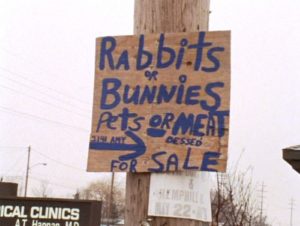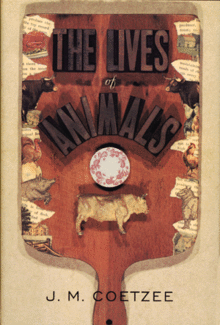I’m breaking a series of self-imposed rules in reviewing The Lives of Animals by J.M. Coetzee, assigned to me by a ‘virtual book club’ I joined.
First, the book has nothing to do – apparently[1] – with money or finance, so has no place on this blog.
Second, obviously, one should never join a book club. The only exception to the ‘never join a book club’ rule is that if your charismatic high school English teacher of twenty-five years ago leads the club, then obviously yes you do need to read and review the book. So you see, I had no choice.
The novel’s conceit is that fiction-writer Elizabeth Costello engages in a series of invited academic lectures and debates about our (humanity’s) ethical treatment of animals.
Costello delivers first emotional, then philosophical, arguments for never eating animals, but also for considering animals as persons worthy of at least as much moral and empathetic consideration as any human.
Taboo debate style
Coetzee/Costello seeks to provoke a strong initial reader response by jumping to our most horrific historical comparison. Costello claims that the treatment of animals – the meat processing industry in particular – resembles in industrial form and morality the horrors of the death camps of the Holocaust.
My same English teacher – with whom I share this book club – introduced us twenty-six years ago to Sylvia Plath’s use of the Holocaust to pervert something as (potentially) banal as a father-daughter relationship.[2] We have to have a strong reaction to the analogy, either in agreement or in opposition, or both.
As educated people, we already know that comparisons to Treblinka and Auschwitz should be forbidden, a taboo reserved for something beyond arguments in favor of mere ‘vegetarianism’ or ‘veganism.’ Interestingly, Coetzee too knows this. He immediately argues against Costello, in the form of an elderly Jewish man who articulates in a letter why such metaphors are both facile and offensive.
With this form of fictional argument and fictional response, Coetzee sets up his novelistic technique. The narrator – Costello’s son – objects to his mother’s zealotry in favor of the moral personhood of animals from page one. Costello makes an argument, and the fictional ‘audience’ responds, often in opposition. In this way Coetzee can remain nimble in his argument. Using the debate format Coetzee presents, then refutes, then strengthens, then objects to, his own arguments in favor of an ethical reorganization of our relationship to non-humans.

Costello asks us to imagine – as other philosophers have before us – what being an ape, or a dog, or a bat would really be like. Could we think or feel our way into their selves? If we could, would that reorder the way we treat other non-human persons?
Sometimes I read the political news of my city, country, and world and wonder whether a ‘fix’ for our most pressing problems comes down to imagining ourselves in the place of others. I limit that ‘empathy deficit’ diagnosis to human societies. Costello, I gather, would have me expand my empathic prescription into non-human societies as well.
Can I change?
What about the argument in favor of the moral personhood of animals, and therefore against the eating of and experimenting with them?
Costello/Coetzee demand an extreme reprioritization of values, a radical change, for which I’m presently unprepared.
As of now, I can’t change the way I treat animals, or at least the way I relate to the meat industry or leather industry or animal-testing pharma industry. I’m not prepared to embrace Costello’s radical reordering.
I read the novel and found myself somewhat moved in the moment, but then returned to eating meat, wearing leather, and using animal-tested pharmaceuticals as soon as I closed the book. For now, Costello’s arguments remain in the pure thought-experiment realm. Can I imagine caring for non-humans so much that I’d consider their personhood before my own convenience, appetite, and comfort?
Best arguments after the novel
I found the strongest argument in favor of Costello’s worldview not delivered by Costello herself in the course of the novel, but rather in one of the “response essays” included in the book.
Barbara Smuts, a primate anthropologist, describes sharing emotions and mutual understanding with both baboons and her dog. The shared companionship between persons – both Costello and Smuts claim and defend the personhood of animals – precludes killing or animal cruelty. Animal-lovers will recognize Smuts’ description of animal friendships she has had in her life, especially with her dog, Safi. Reading Smuts, I wanted to experience baboon and dog companionship the way she has. If I had, would that be enough to change my behavior and moral relationship toward animals?
One of my favorite essays to highlight our unthinking cruelty and selfishness toward non-humans is David Foster Wallace’s “Consider The Lobster,” from a book of essays with the same name.
Wallace concludes his musing on a Maine lobster festival with an exhortation to consider the pain these creatures actually feel – contrary to our unthinking, greedy, hungry slaughter of them in a pot – while being boiled alive. Chances are, Wallace argues, the lobster experiences extraordinary pain before it dies for our pleasure. Knowing that, can we innocently enjoy a lobster feast?
Again, I read Wallace, I totally appreciate his making me uncomfortable with my unthinking gluttony, and then I return to my lobster feast every summer.
Is this about animals at all?
One of the ways this little novel messes with you (or at least, with me) is the problem of whether this treats mostly of an ethical approach to animals at all.
Or is something else at stake for Coetzee?
The response essay by Marjorie Garber changes the frame of the novel entirely. Garber reminds us that Coetzee’s chosen form – a novel built on a series of academic lectures by a novelist – following lectures that the novelist Coetzee gave in real life at Princeton, creates a kind of game for Coetzee to play hide-and-seek with his own beliefs. How much of Costello’s ideas does he embrace, versus how much does he pursue some other meta-fictional aim?
I had not anticipated Garber’s final response-question, on this meta-fictional point. Garber suggests that Coetzee aims at exploring the value of literature in changing our mindsets. If we can read and engage in Costello’s extreme fictional worldview, do we shift our own view in real life?
Is the point of the novel, maybe, to set up an extreme case of radical empathy? Maybe an extreme case that cannot be fulfilled, since we cannot (at least I cannot) really empathize with a bat? Does the thought experiment of this kind of empathy produce results in readers?
I don’t know. I’m looking forward to my virtual book club discussion in a few weeks time.
[1] Important note: I don’t really know WHAT this book is about.
[2] You kind of never forget the first time reading Sylvia Plath’s “Daddy.” “I have always been scared of you, With your Luftwaffe, your gobbledygoo. And your neat mustache And your Aryan eye, bright blue. Panzer-man, panzer-man, O You –…There’s a stake in your fat black heart And the villagers never like you…Daddy, Daddy, you bastard, I’m through.” Good times!
Please see related posts
All Bankers Anonymous Book Reviews in One Place!
Post read (628) times.



